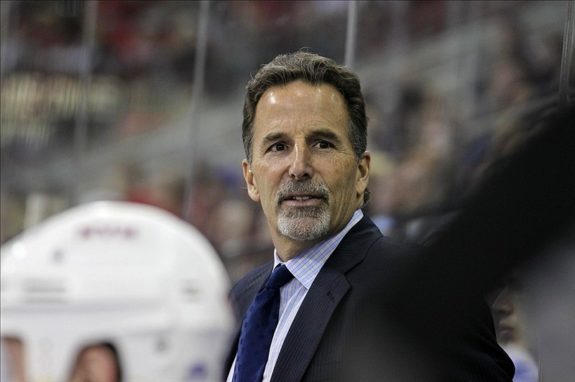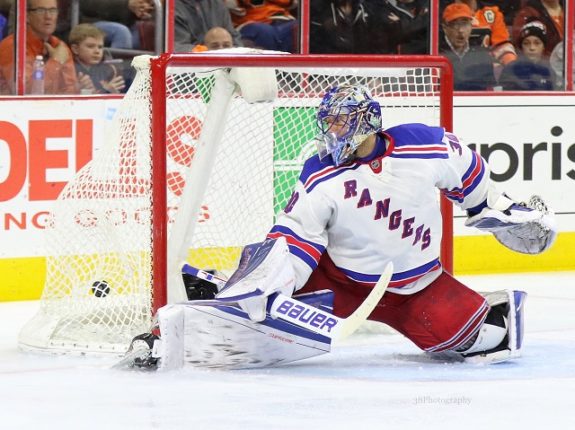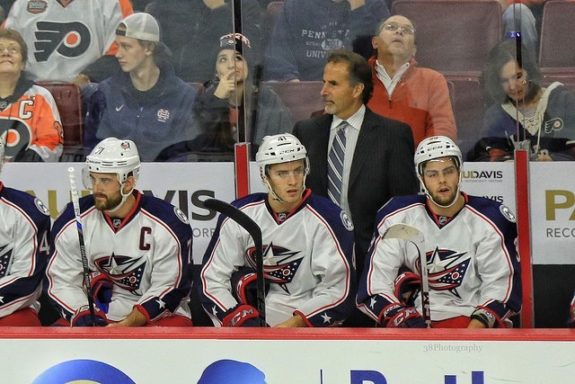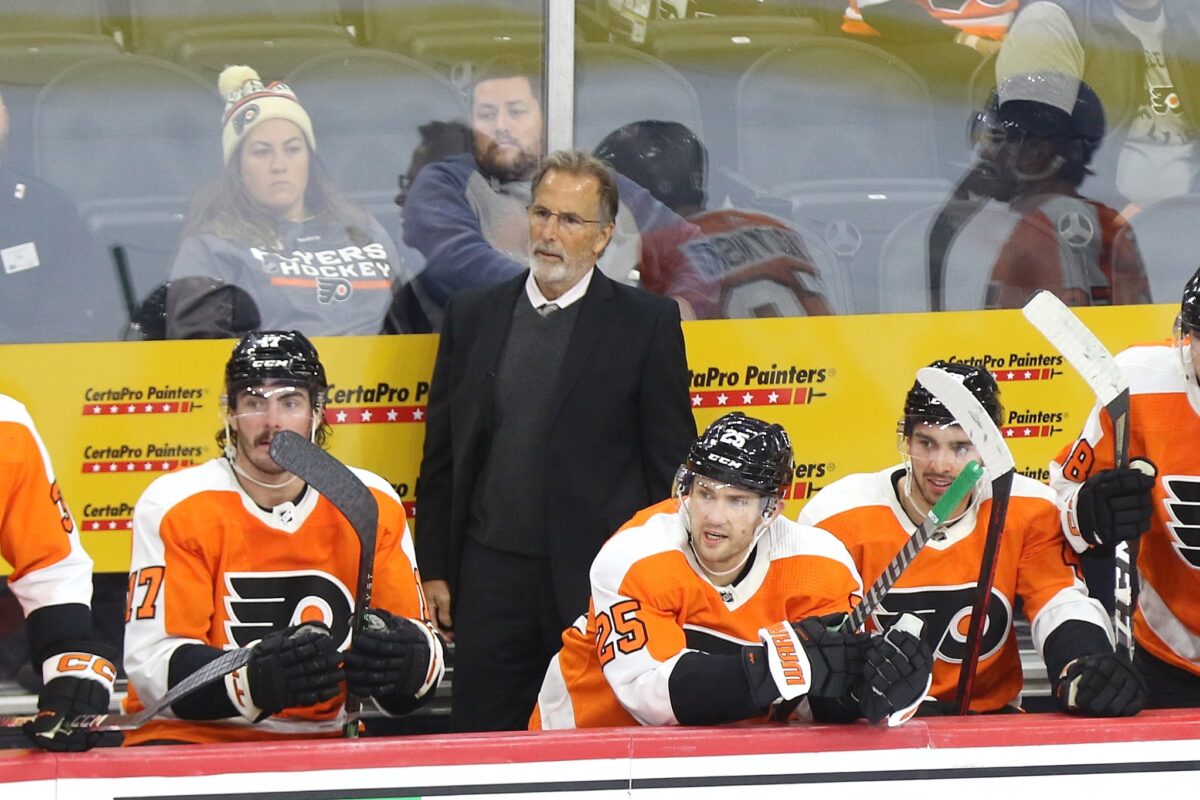The Philadelphia Flyers have become the John Tortorella show during the first season under their new head coach. From his stoned-faced press conference attitude to his contentious decisions to sit veteran NHL players, the former Stanley Cup winner has dominated the headlines in Philadelphia in 2022-23. The Flyers might lack the talent to compete with the top tier of the NHL, but they’ve taken a step forward after disastrous seasons in 2020-21 and 2021-22.
They have won nine of 13 since the holiday break. Tortorella has implemented a more effective structure and established a standard for a group that lost its way during the previous two seasons. While the future in Philadelphia still has a long list of question marks, the trajectory of the product on the ice in 2022-23 aligns with the initial growing pains their head coach had in his previous NHL stops before achieving his best moments of success.
Related: Flyers News & Rumors: Provorov, Frost, Kane & van Riemsdyk
What can the Flyers learn about the direction the franchise is heading based on the history of their head coach in his four extended stops in the NHL?
Tampa Bay Lightning (2001-2008)
Tortorella stepped behind the bench for the Tampa Bay Lightning in his first extended look as an NHL head coach for 43 games to finish the 2000-01 season. He didn’t gain footing with an underwhelming roster and a franchise with no hockey tradition. His first full season in 2001-02 season included some minimal improvement and a general manager (GM) change.
Vincent Lecavalier and Brad Richards, Tampa Bay’s first two selections in the 1998 NHL Entry Draft, didn’t break out until the 2002-03 season. The addition of Martin St. Louis, one of the best free agent pickups of all time, gave the Lightning a formidable attack that helped them advance in the postseason for the first time in franchise history during the 2003 Stanley Cup Playoffs.

The developing core made the hockey world take the state of Florida seriously in 2003-04. They finished as the top seed in the Eastern Conference and blew through two easy series with an 8-1 record to advance to the Conference Final. They defeated a surging Flyers team in a tightly-fought seven-game series that Tortorella later mentioned as the point when he grew his respect for the city of Philadelphia and the Flyers as an organization.
Tortorella and the Lightning became Stanley Cup champions with a victory over the Calgary Flames. The momentum of an excellent young core died down with the cancellation of the 2004-05 season, but Tortorella led the Lightning to two more playoff berths before they let him go in June 2008. GM Jay Feaster spoke about Tortorella’s impact on the franchise.
“This was a country club, a retirement home. It was a place players came to retire, they just forgot to tell us they were doing it.” Feaster said. “John came in and changed the culture, changed the way we do business and the attitude. And in so doing, he raised expectations.”
The idea of a culture change became a major talking point when the Flyers hired Tortorella. It’s a subjective concept, and Tortorella admitted as much during the summer by trying to shift the focus to results that could only come over time.
New York Rangers (2009-2013)
Tortorella moved from a market with no tradition to an Original Six franchise when he took over for the New York Rangers in February 2009. The Blue Shirts previously rode the star power of a resurgent Jaromír Jágr to three straight playoff appearances after the 2004-05 lockout, but the future Hall of Famer’s return to Czechia left them looking to move in a new direction in 2008-09.
The Rangers snuck into the 2009 Stanley Cup Playoffs only to go down in the opening round. It’s the only time Tortorella has led a team to the playoffs in his first season as a head coach. They narrowly missed the final spot in the postseason in 2009-10 with a shootout loss to the eventual Eastern Conference champion Flyers on the final day of the regular season.

The attractive destination and financial advantages of New York City helped the Rangers stockpile the top-end talent needed to compete during Tortorella’s tenure. They added a 27-year-old Marián Gáborík entering the 2009-10 season, Tortorella’s old friend Richards entering the 2011-12 season, and Rick Nash entering the 2012-13 season. The Rangers made three consecutive playoff appearances in 2010-11, 2011-12, and 2012-13 and advanced to the Eastern Conference Final in 2012. While Tortorella never made it back to the Stanley Cup Final before the Rangers let him go in 2013, he established himself as one of the best coaches in the NHL with a second successful run.
Looking back at his tenure in New York should remind the Flyers that Tortorella can raise a historically prominent franchise back from the doldrums if he has enough of a leash. The talented veterans the Rangers acquired during Tortorella’s tenure also didn’t fully hit their stride in New York for reasons inside and outside his control. It significantly contributed to his downfall.
Vancouver Canucks (2013-2014)
Tortorella’s one-year tenure with the Vancouver Canucks is the outlier of his coaching career and a cautionary tale that needs to be considered with such a polarizing head coach. He signed a five-year contract in 2013 and burnt out after only one season. The tenure never got off the ground properly. Tortorella moved into a home a significant distance away from Vancouver, and his demands as a coach never meshed well with franchise heroes Henrik and Daniel Sedin.

The most unforgettable moment of his tenure came against the Calgary Flames in January 2014 when he chased opposing head coach Bob Hartley for a confrontation down the visitor’s tunnel after the first period. Tortorella called the incident “embarrassing to my organization and my team.” He even later admitted that he deserved to be fired after the one-year trainwreck.
The Flyers deliberately chose Tortorella for the fire and attitude that he brings to the organization. Baggage comes with that decision. They signed up for frequent spats with the media and a tenuous relationship with a player like Kevin Hayes paid as a franchise centerpiece. While Tortorella has a long and respectable track record as an NHL head coach, his polarizing attitude always leaves the chance of a complete disaster.
Columbus Blue Jackets (2015-2021)
Tortorella took over a second franchise with no hockey tradition in 2015. The Columbus Blue Jackets had two postseason appearances in 15 years and no playoff series victories before they hired the best coach in franchise history seven games into the 2015-16 season.
After they missed the playoffs during his first season, Tortorella kept them in the fight for the high-powered Metropolitan Division with the Washington Capitals and the Pittsburgh Penguins for the entire 2016-17 season. The Blue Jackets lost in the opening round of the playoffs to Pittsburgh at the peak of the Sidney Crosby era, but Tortorella became the fourth coach in NHL history to win his second Jacks Adams Award. Barry Trotz has since become the fifth.
Two years later, the Blue Jackets swept the best regular-season team in the salary cap era with the signature performance of their franchise history in the opening round of the 2019 Stanley Cup Playoffs against the Lightning. They made the playoffs in four of six seasons under Tortorella.

Columbus never boasted a roster of overwhelming offensive firepower during this time period. Artemi Panarin spent two seasons under Tortorella in 2017-18 and 2018-19, but current Flyers winger Cam Atkinson was their most consistently productive offensive player over the full six-year span. The hot start from Travis Konecny in 2022-23 under his new head coach has brought up comparisons to Atkinson in Columbus. The work of former Columbus and current Philadelphia assistant coach Brad Shaw benefitted Atkinson’s style on the penalty kill the same way that Konecny is now thriving in shorthanded minutes.
More similarities between Tortorella’s relationships with players in Columbus and his relationships with current Flyers also exist. For instance, the Boston, MA native coached talented defensemen Zach Werenski and Seth Jones in their early 20s. He reached a good balance in allowing them to play an aggressive game to try to produce offensively while also holding them accountable for defensive responsibilities. He is trying to implement the same type of approach with Cam York in Philadelphia. Tortorella has also compared a roaming defenseman like York to Dan Boyle, a key contributor to Tampa Bay’s 2004 Stanley Cup run.
Tortorella famously butted heads with Pierre-Luc Dubois, who was eventually traded for Patrik Laine. He benched both talented forwards at points in Columbus. Hayes and his new head coach will need to build a healthier working relationship if the Flyers plan to keep the 6-foot-5 center in Philadelphia until the end of his contract in 2026.
What the Flyers Can Learn
The Flyers would need drastically unexpected circumstances to earn a playoff spot in 2022-23. The organization wasn’t in a good position to contend when they hired Tortorella in June, and they aren’t now. However, they’ve inched closer toward their goal of stabilizing under a veteran head coach and moving back to respectability after their embarrassing fall from grace over the last decade. Missing the playoffs in his first season didn’t ruin Tortorella’s tenure in Tampa Bay or Columbus, and it doesn’t have to ruin his tenure in Philadelphia.

Whether or not fans and media agreed with the goal of stabilization and minimal improvement, the organization had no intention of clearing out the roster with the hopes of tanking for a better draft position. They instead focused on creating a new standard for performance, a better structure on the ice, and a better competitive attitude. They’re learning who is part of the future in Philadelphia, and that’s exactly what they wanted out of 2022-23.
The Flyers have problems that can’t be solved by an effective head coach bringing valuable intangibles. They’ll hope for current NHL players like Konecny and Joel Farabee or prospects like Cutter Gauthier and Tyson Foerster to exceed expectations and become franchise superstars. However, they have no clear plan to acquire the type of offensive firepower needed to win a Stanley Cup.
Tortorella also hasn’t seen eye-to-eye with GM Chuck Fletcher. The two have used conflicting language about the supposed “rebuild” in Philadelphia, and their evaluation of talent is far apart. Tortorella knows these problems keep the illustrious buzzword “identity” out of reach for the Flyers.
“When you can call your team ‘this,’ whatever that identity is, it needs to be consistent. Consistent isn’t two weeks. Consistent, quite honestly, isn’t regular season. Consistent is when you get to playoffs and you’re doing it there,” he said on Jan. 11.
The Flyers have played well for 13 games. They still have a long way to go if they’re following Tortorella’s plan of building a consistent identity.